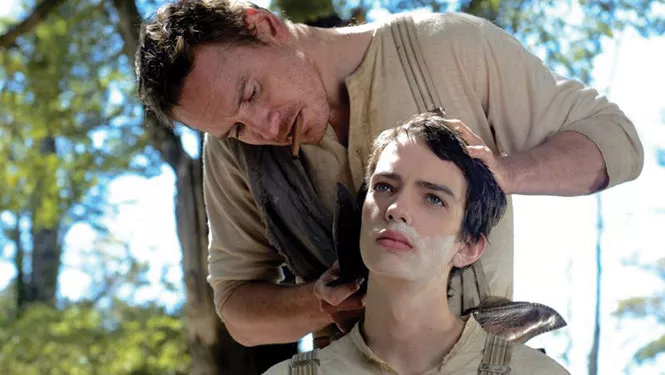
- Slow West
The "revisionist Western" is hardly a brand-new concept. You could probably go back 50 years to The Man Who Shot Liberty Valance's "print the legend"—or even farther, if you consider something like The Searchers—to find a time when movies were already wrestling with the mythology of the American frontier. But you can still learn a lot about the way we're looking at our present from the way we're looking at our past—and sometimes from the way people outside America are looking at that past.
Slow West is certainly made up of an odd mix of elements for a story about the 19th-century American West: written and directed by Scottish artist/musician John Maclean, filmed mostly in New Zealand, and casting its leading men via Ireland and Australia. There's also something marvelously fitting about that pedigree, since Slow West turns out to be about the American melting pot in some fairly compelling ways. And it may be even more compelling—if deeply cynical—about the pitiless drive for survival that erases all romanticism about a wide-open land of opportunity.
Slow West opens in 1870 in the Colorado territory, where teenage Scottish aristocrat Jay Cavendish (Kodi Smit-McPhee) is seeking his beloved Rose (Caren Pistoious). In flashback, we learn that Rose and her father (Rory McCann) were forced to flee Scotland for their lives, and that Jay himself may have been partly responsible for their exile. But the greenhorn Jay is far from capable of surviving the frontier on his own, which is obvious to mercenary gunman Silas (Michael Fassbender), who offers to serve as Jay's escort. And Silas may have other reasons for sticking close to Jay: There's a sizable bounty on Rose and her father's head, and Jay is leading Silas right to her.
Writing and directing his first feature, Maclean doesn't always seem particularly comfortable crafting characters. Fassbender's taciturn gunslinger and Smit-McPhee's naïf both often feel somewhat rote, and Maclean's use of narration by Fassbender's Silas feels like one of those cases of a filmmaker who couldn't come up with a more naturalistic way of conveying the same information. While there's nothing inherently wrong with only hinting at the reasons Silas split from a band of bounty hunters led by Payne (Ben Mendelsohn), there's an ongoing sense that the characters in Slow West are far less interesting than the thematic ideas for which they're providing a delivery system.
Fortunately, those ideas are pretty fascinating. Nearly every key encounter in Slow West involves a generally violent collision between cultures: the American Indians who are either the targets of genocidal hunts or horse thieves; a desperate couple robbing a general store; a chance meeting between Jay and a German writer researching the indigenous people; a trio of black men singing a song in French by the side of the road. Few of these encounters end happily, and Maclean paints a bleak picture of this wide-open land that is romanticized as a place to start fresh. It's no coincidence that Darwin is invoked at one point, inspired by a darkly comic moment when they find a dead body. This is an eat-or-be-eaten world, and one where the ability to think on your feet—as Jay does when he fashions a makeshift clothesline between his and Silas' horses to dry out their flood-soaked clothes—might end up saving you more than once.
But Maclean really demonstrates his own filmmaking ingenuity during Slow West's key action set pieces. The first comes during that aforementioned general-store robbery, as Maclean paces the inevitable bloody confrontations with perfect ratcheting tension. And then there's the magnificent climactic shootout, with Payne and his gang attacking the small homestead of Rose and her father, with Jay and Silas attempting to come to the rescue. Maclean makes magnificent use of the physical space—the high grasses of the surrounding fields, the doorways and windows of the house—for something that keeps providing startling moments, as well as a fairly painful wake-up call for Jay. The characters may often feel like props for Maclean's observations on the violent conflicts that built America, but he shows that Westerns can still provide thrilling shoot-'em-ups, even if they're ultimately indifferent to an idealized notion of happy endings.
SLOW WEST